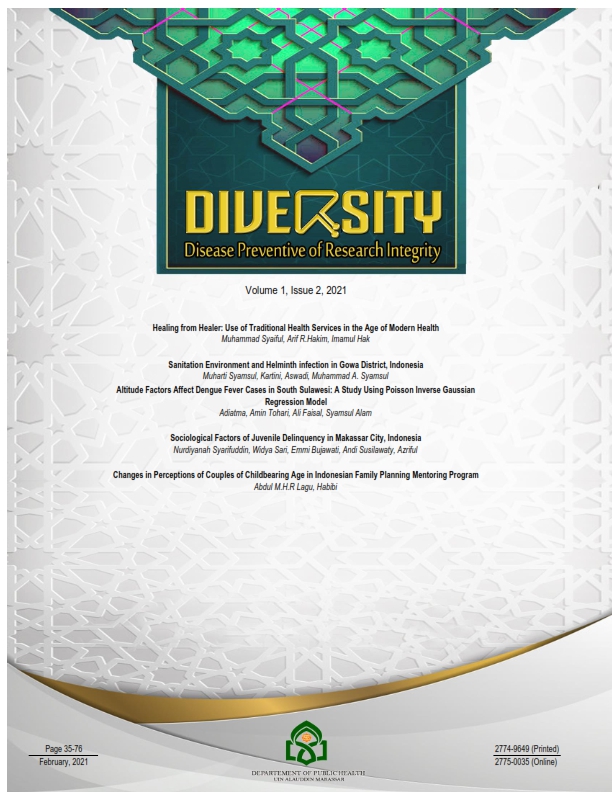Healing from Healer: Use of Traditional Health Services in the Age of Modern Health
Abstract
The phenomenon of traditional health practices is still being used by some people, the unique thing is that those who take advantage of this health service do not only come from underprivileged segments of society but are also often used by the rich. Moreover, this phenomenon occurs during the existence of a modern health industry whose access is increasingly accessible to all people. Traditional medicine or so-called alternative medicine that uses plant-based medicines (herbal) or other media. Not only in the area of medicine, but this research also describes traditional healers or as local, sanro, as an alternative to modern health industry practices. This study uses an ethnographic method with a participatory-observative approach to understanding in-depth the practice of alternative medicine. Field research focus in the district. Somba Opu, Gowa Regency, South Sulawesi. Where the distribution of modern health facilities in the capital of this sub-district is higher than in other sub-districts. The results of the study indicated that the medical instruments performed by traditional healers, apart from using traditional herbs in the form of special plants, also used mantras written in the book using Arabic letters. Some of the traditional medicinal methods in maintaining their existence are carried out, both in the form of good health services, trying to prove the efficacy of the treatment, and strengthening their networks with doctors and fellow sanro outside the District of Gowa.

Downloads
References
Abbas, I. (2013). Pappaseng: Kearifan Lokal Manusia Bugis Yang Terlupakan. Sosiohumaniora, 15 (3), 272.
Amisim, A., Kusen, A. W., & Mamosey, W. E. (2020). Persepsi Sakit Dan Sistem Pengobatan Tradisional dan Modern Pada Orang Amungme (Studi Kasus di Kecamatan Alama Kabupaten Mimika). Holistik, Journal Of Social and Culture, 13(1).
Ardani, I. (2013). Eksistensi dukun dalam era dokter spesialis. Lakon: Jurnal Kajian Sastra dan Budaya, 2(1), 21-26.
Azizah, A. N., Raodhah, S., Surahmawati, S., & Alam, S. (2020). Utilization of The Chronic Disease Management Program During The Covid-19 Pandemic. Diversity: Disease Preventive of Research Integrity, 1(1), 21-29.
Bauto, L. M. (2014). Perspektif Agama Dan Kebudayaan Dalam Kehidupan Masyarakat Indonesia. Jurnal Pendidikan Ilmu Sosial, 23(2).
Bourdieu, P. (2005). Habitus: A sense of place. Gower Publishing, Ltd..
Damaiyanti, V. P. (2015). Sinergisitas Bidan Dan Dukun Beranak: Paradoks Kearifan Lokal Dan Kebijakan Pemerintah Dalam Menurunkan Angka Kematian Ibu Dan Bayi. Prosiding PKWG Seminar Series.
Gitawati, R. (2009). Pemanfaatan Pengobat Tradisional oleh Masyarakat. Jurnal Kefarmasian Indonesia, 1(1), 10-17.
Hamid, A. (2008). Pengobatan tradisional berbasis lontara di Sulawesi Selatan. Makassar : Dinas Kebudayaan dan Pariwisata, Provinsi Sulawesi Selatan
Husaini, H., Rahman, F., Lenie, M., & Rahayu, A. (2020). Buku Ajar Antropologi Sosial Kesehatan. Universitas Lambung Mangkurat
Isniati, I. (2012). Kesehatan Modern dengan Nuansa Budaya. Jurnal Kesehatan Masyarakat Andalas, 7(1), 39-44.
Kartika, D., Sewu, P. L. S., & Rullyanto, W. (2016). Pelayanan kesehatan tradisional dan perlindungan hukum bagi pasien. SOEPRA, 2(1), 1-16.
Kusumah, D. (2017). Pengobatan Tradisional Orang Bugis-Makassar. Patanjala, 9(2), 245.
Notoatmodjo, S. (2011). Kesehatan Masyarakat Ilmu dan Seni. Rineka Cipta
Octaviana, A., Rachmawati, D. A., & Nurdian, Y. (2019). Hubungan antara Beban Kerja Fisik dengan Kualitas Hidup Kuli Panggul. Al-Sihah: The Public Health Science Journal, 11(1).
Pelras, C. (2000). Patron-client ties among the Bugis and Makassarese of South Sulawesi. Bijdragen tot de taal-, land-en volkenkunde/Journal of the Humanities and Social Sciences of Southeast Asia, 156(3), 393-432.
Silalahi, M. (2016). Studi etnomedisin di Indonesia dan pendekatan penelitiannya. Jurnal Dinamika Pendidikan, 9(3), 117-124.
Sukmal, M., Syamsuwir, S., & Satriadi, I. (2020). Syifadalam Perspektif Alquran. Istinarah: Riset Keagamaan, Sosial dan Budaya, 1(2), 87.
Syuhudi, M. I., Sami, M. Y., & Said, M. B. (2013). Etnografi Dukun: Studi Antropologi tentang Praktik Pengobatan Dukun di Kota Makassar. Makasar: Balai Penelitian dan Pengembangan Agama Makassar.
Togobu, D. M. (2019). Gambaran Perilaku Masyarakat Adat Karampuang Dalam Mencari Pengobatan Dukun (Ma’sanro). J-KESMAS: Jurnal Kesehatan Masyarakat, 4(1), 16-32.
Triratnawati, A. (2010). Pengobatan tradisional, upaya meminimalkan biaya kesehatan masyarakat desa di Jawa. Jurnal Manajemen Pelayanan Kesehatan, 13(2), 69-73.
Yuningsih, R. (2012). Pengobatan Tradisional di Unit Pelayanan Kesehatan. Info Singkat Kesejahteraan Sosial, 4(5), 9-12
Copyright (c) 2021 Muhammad Syaiful, Arif Rahman Hakim, Imamul Hak

This work is licensed under a Creative Commons Attribution-NonCommercial-ShareAlike 4.0 International License.
Authors retain copyright and grant the journal right of first publication with the work simultaneously licensed under a Creative Commons Attribution-NonCommercial-ShareAlike 4.0 International License that allows others to share the work with an acknowledgment of the work's authorship and initial publication in this journal.
Authors are able to enter into separate, additional contractual arrangements for the non-exclusive distribution of the journal's published version of the work (e.g., post it to an institutional repository or publish it in a book), with an acknowledgment of its initial publication in this journal.
Authors are permitted to publish their work online in third parties as it can lead to wider dissemination of the work.




